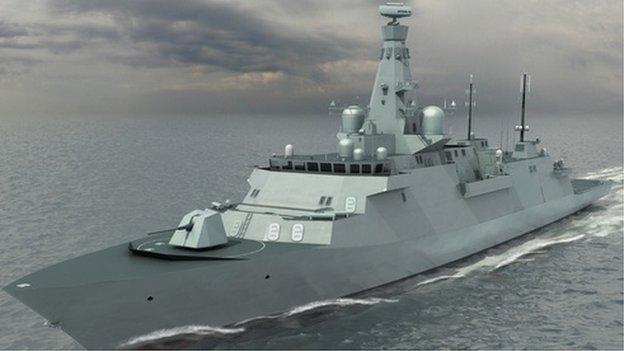Ex-Navy boss Lord West says lack of cash is delaying Type 26 project
- Published
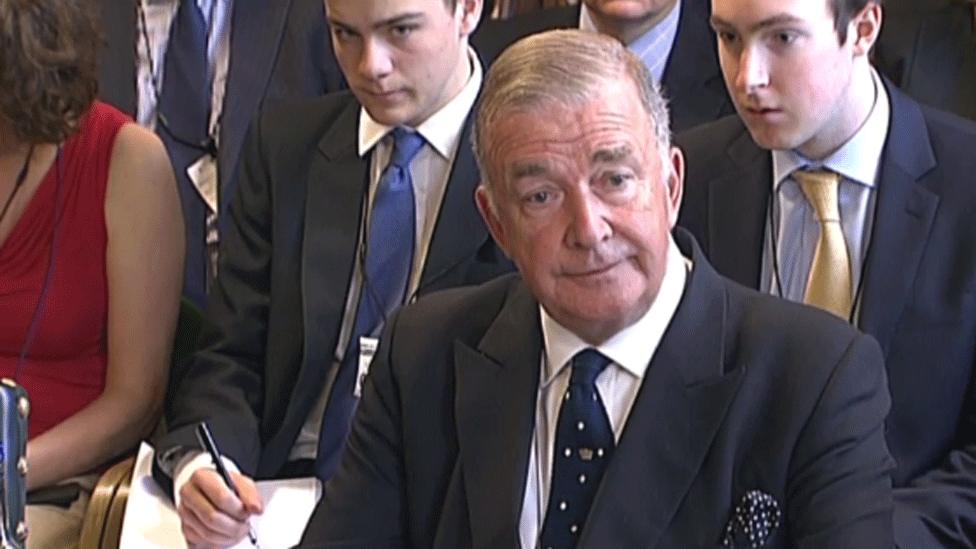
Admiral Lord West told the defence committee that the MoD had effectively "run out of money".
A former head of the Navy said the UK government "must come clean" and admit lack of money is delaying a frigate building programme on the Clyde.
Admiral Lord West, First Sea Lord between 2007 to 2010, told the defence committee that the MoD had effectively "run out of money".
MPs are looking at claims the timetable for the new Type 26 has slipped.
The committee heard that work was scheduled for this year but may not start until the first part of 2018.
Union bosses, who represent workers at the Govan and Scotstoun shipyards, where the frigates are due to built, are worried that if the project continues to be delayed jobs could be lost.
The UK government confirmed in its Strategic Defence and Security Review in November that eight Type 26 frigates would be built on the Clyde, although the total number was scaled back from 13.
In the meantime, the BAE Systems-run yards are being sustained by Ministry of Defence orders for new offshore patrol vessels.
Lord West appeared before MPs at Westminster alongside Sir Mark Stanhope, former First Sea Lord and Chief of Naval Staff, and Peter Roberts, senior research fellow for sea power and maritime studies at RUSI (Royal United Service Institute).
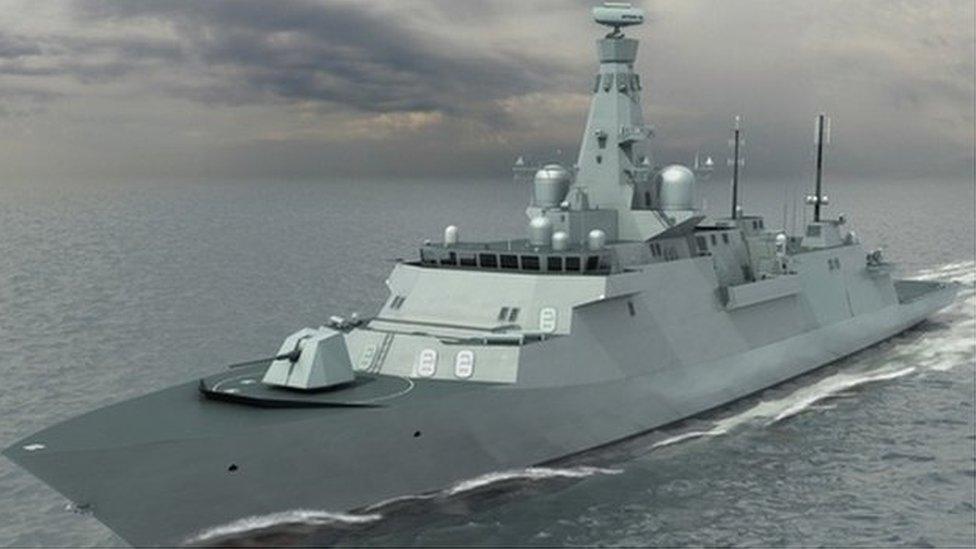
The next generation of Royal Navy frigates are due to be built on the Clyde
The peer, who sits on the Labour benches in the House of Lords, told the committee: "There is almost no money available this year and we are really strapped next year. The government aren't coming clear about that. I think if they did people would understand.
"We have run out of money effectively and they [MoD] have pushed this programme to the right and that is bloody dangerous because whenever you do that you end up costing more money and we did that in the early 1990s for the astute class subs. Finally the order came in two months before the election.
"It has taken almost 20 years to get submarine building back on track properly and has cost an extra three-quarters-of-a-billion more than if we had got on with it then.
"This is where the Treasury don't see the long term thing and we are in danger of doing the same thing with our surface warship capability of the Type 26."
He added that a "steady drumbeat of orders" was needed to keep "high tech industries" going.
The UK government said it remained committed to shipbuilding on the Clyde.
In April, Scottish Secretary David Mundell told the BBC: "Obviously it is for BAE Systems on how they deal with their operational requirements and I very much want to see them engaging with the trade unions to ensure that they have a smoother transition through to the Type 26 programme."
'Workforce is ready'
The committee also took evidence from representatives of BAE Systems, GE Energy Connections - Power Conversion, Northrop Grumman and Rolls-Royce.
John Hudson, managing director of BAE Systems, was asked if the frigate programme was to go ahead tomorrow, would the Clyde yards be ready.
He told MPs that the ability to start would depend on three things;
the "maturity" of the design
the ability to "mobilise" the supply chain
and "modest" infrastructure changes to the Clyde and Scotstoun yards
Mr Hudson added: "We would need to accelerate some of those activities to accelerate the building of those vessels."
He went on to tell the committee: "We are in detailed negotiations with the MoD as to the build programme for Type 26, we continue those discussions."
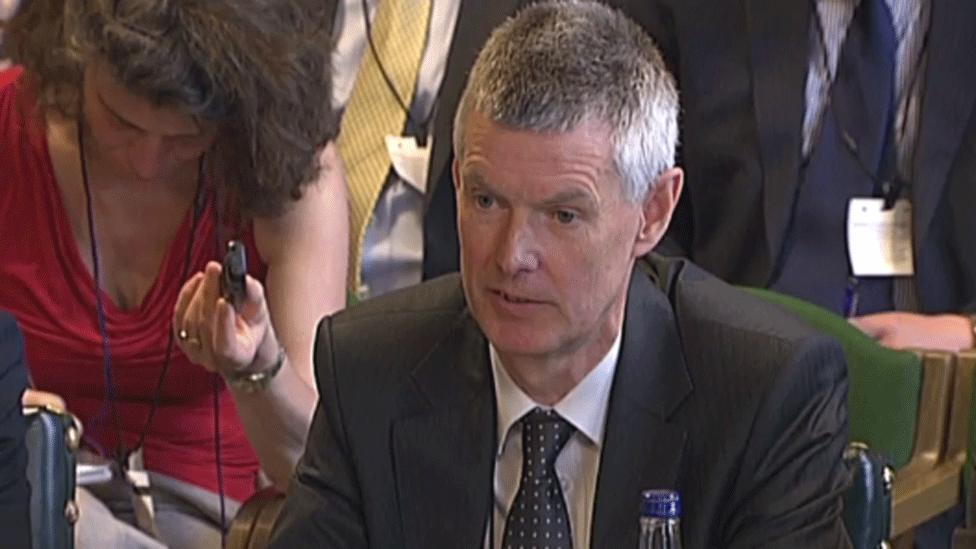
BAE's John Hudson told the committee that negotiations were ongoing with the MoD
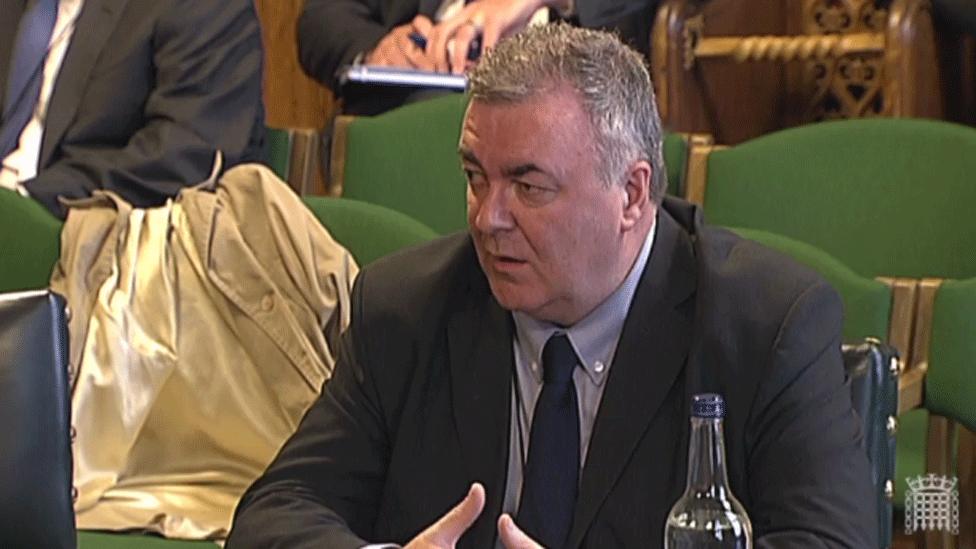
Unite's Duncan McPhee said the workforce on the Clyde was "very concerned" about the slipping timetable
In addition, MPs also heard from Unite union official Duncan McPhee.
He said that with a likely delay skilled workers would have to be sent elsewhere, such as Barrow. He believed such a move would "mess up the drumbeat" of construction.
Mr McPhee said the workforce on the Clyde was "very concerned" about the slipping timetable.
During questioning by SNP MP Douglas Chapman, the union boss said: "We have the workforce ready to do it [build the Type 26].
"If you are saying, could we start immediately, we could do it reasonably soon I think, but there would be design issues because obviously with the date moved to the right things have slowed down.
"We released some designers last year who were working on the programme, but we could get it back on track quite quickly and also it would need to fit in with the Offshore Patrol Vessel programme as well."

How has the timetable slipped?
Original plan
2016 - first steel cut for Type 26
2021 - handover of first ship
2022 - brought into service
BAE System's managing director, John Hudson, explained to the committee that in 2013 the plan was for Govan and Scotstoun to build three Offshore Patrol Vessels (OPVs), followed by the Type 26. After the 2015 MoD review, a request was made for two further OPVs, impacting on when the Type 26 work would start.
Possible new plan
2017 - first steel cut at the end of the year
2023 - handover of first ship
2025 - brought into service
Committee chairman Julian Lewis put to Mr Hudson what the new timetable would be. The BAE chief would not be drawn on the dates, stating that his company was currently in negotiations with the MoD.
- Published23 April 2016

- Published22 April 2016

- Published21 May 2015
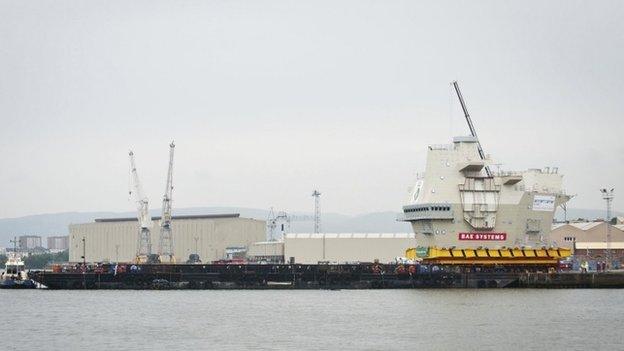
- Published20 February 2015
